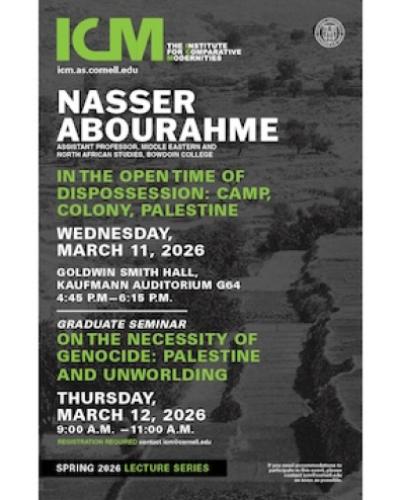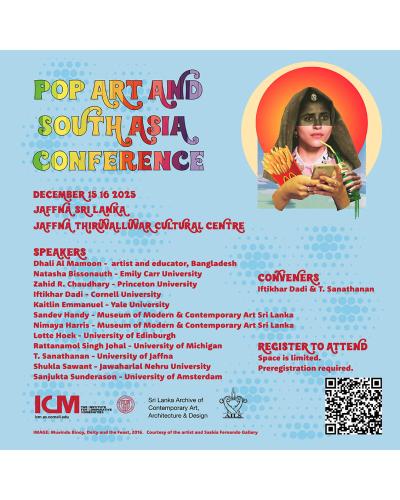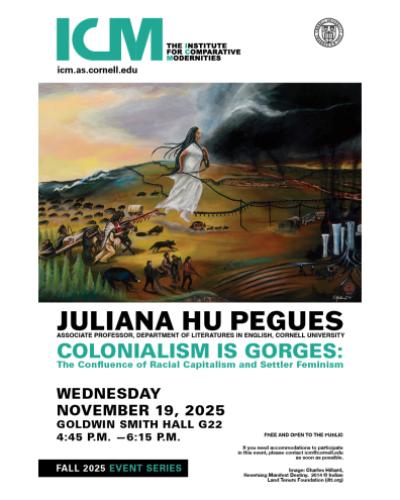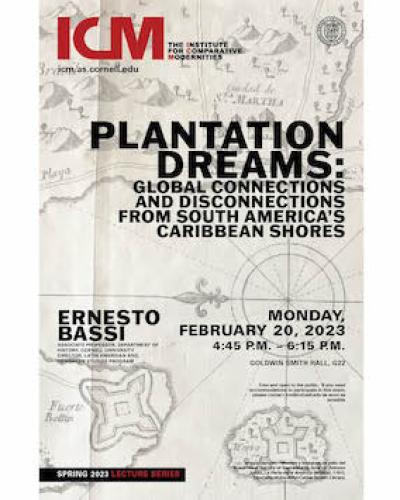ICM LECTURE SERIES SPRING 2023
Monday, February 20, 2022 at 4:45pm to 6:15pm
Goldwin Smith Hall G22
ERNESTO BASSI
Associate Professor, Department of History Cornell University
Director, Latin American and Caribbean Studies Program
"Plantation Dreams: Global Connections and Disconnections From South America's Caribbean Shores"
Abstract
During the late eighteenth century, Santa Marta (located in South America’s Caribbean coast) was a secondary province of a secondary viceroyalty in a Spanish empire undergoing renovations. Its doubly peripheral status did not mean isolation. In fact, Santa Marta, as evidenced by the writings and trajectory of Antonio Narváez y la Torre, was plugged in to the global circuits that connected the late early modern world. It was, at the same time and for certain purposes, also disconnected from these circuits.
In this talk I look at Narváez’s trajectory and his vision of a prosperous Santa Marta to approach an understanding of early modern globalization from the perspective of one particular place. The view from Santa Marta reveals the fact that Santa Marta’s elites had access to information flowing back and forth across the Atlantic. This information allowed Narváez and others to envision an export-oriented Santa Marta actively contributing raw materials (brazilwood, cacao, sugar, and cotton) to the growing European industrial centers. Using the journey of the frigate San Antonio, I connect Narváez’s visions (or dreams) with one of the early efforts to turn them into reality, an ambitious expedition that brought brazilwood from Santa Marta to Amsterdam, then sailed, loaded with rifles, to Boni (in western Africa), where it obtained enslaved Africans, with whom it sailed back to the Caribbean. Like the larger dreams of plantations Narváez envisioned, the journey of the San Antonio ended in a dramatic failure. Yet, just as the shattered dreams to turn Santa Marta into a vibrant plantation economy, the scheme of the San Antonio sheds light on the possibilities and limits that the flow of ideas, commodities, and people offered marginal places, like Santa Marta, to aspire to become key nodes of an increasingly connected, capitalist world.
Bio
Ernesto Bassi Arevalo is an associate professor of history in the College of Arts and Sciences. His research interests coalesce around two significant questions: How do people develop geographic and cultural identifications? How do geographic regions come into being?
In particular, he is interested in the role circulation (of goods, people, news, and ideas) plays in the configuration of geographic spaces, collective identities, geopolitical projects, and political allegiances. He explores these themes from a Latin American and Caribbean perspective, especially by looking out to the world from the Caribbean coast of Colombia.
His first book, An Aqueous Territory, examines the configuration of a trans-imperial Greater Caribbean and its inhabitants’ geopolitical imagination through a study of the role of sailors in the creation of a regional space and the multiple ways in which less mobile (but by no means static) subjects, including autonomous indigenous groups, sugar planters, military adventurers, and nation makers, experienced the region sailors created.
His broader interests include the emergence of globalization during the early modern period, hemispheric connections and mobilities, the history of late colonial and early national Latin American countries (especially Colombia and its Caribbean region), indigenous-European encounters in the Caribbean Basin, the rise of capitalism, the development of plantation societies in the Caribbean, the flow of ideas, people, and commodities across the Atlantic Ocean, and the role of oceans in world history.
Professor Bassi is from Colombia and, without a student visa, would not have been able to pursue doctoral studies nor become a professor at Cornell. He teaches students how to understand the process of creation of patriotic narratives and to identify the purposes behind those narratives, as well as the multiple perspectives these narratives seek to erase. He thinks that international students are an important part of what makes U.S. universities and the U.S. great.





